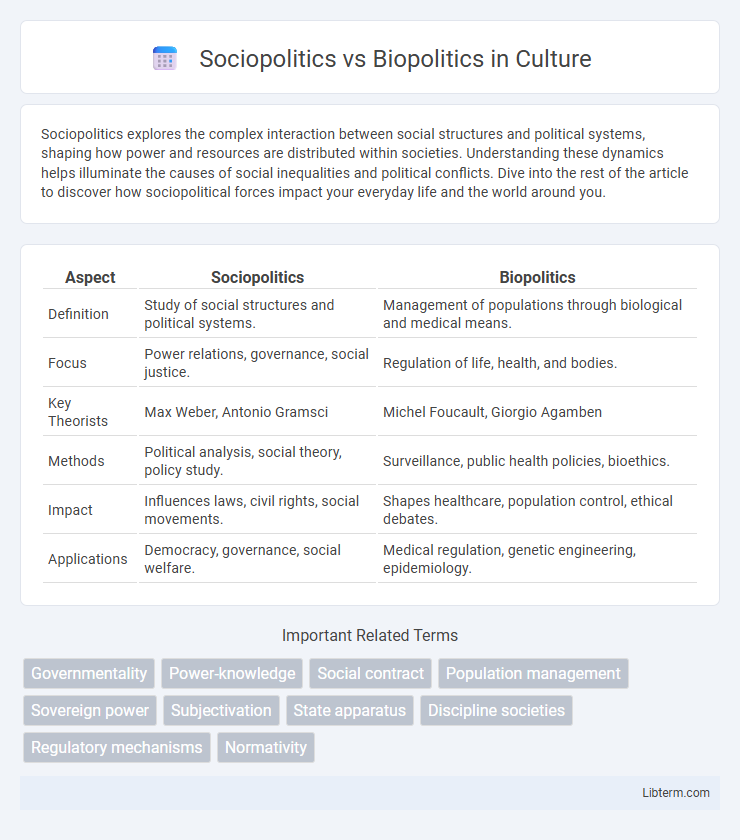Sociopolitics explores the complex interaction between social structures and political systems, shaping how power and resources are distributed within societies. Understanding these dynamics helps illuminate the causes of social inequalities and political conflicts. Dive into the rest of the article to discover how sociopolitical forces impact your everyday life and the world around you.
Table of Comparison
| Aspect | Sociopolitics | Biopolitics |
|---|---|---|
| Definition | Study of social structures and political systems. | Management of populations through biological and medical means. |
| Focus | Power relations, governance, social justice. | Regulation of life, health, and bodies. |
| Key Theorists | Max Weber, Antonio Gramsci | Michel Foucault, Giorgio Agamben |
| Methods | Political analysis, social theory, policy study. | Surveillance, public health policies, bioethics. |
| Impact | Influences laws, civil rights, social movements. | Shapes healthcare, population control, ethical debates. |
| Applications | Democracy, governance, social welfare. | Medical regulation, genetic engineering, epidemiology. |
Defining Sociopolitics: An Overview
Sociopolitics examines the interplay between social structures and political power, emphasizing how societal norms, values, and institutions influence governance and public policy. It addresses issues such as social stratification, political behavior, and collective identity within political frameworks. Understanding sociopolitics requires analyzing the impact of cultural dynamics and social movements on political decision-making and power distribution.
Understanding Biopolitics: Key Concepts
Biopolitics centers on the governance of populations through the regulation of life processes, emphasizing state control over biological and bodily aspects such as health, reproduction, and mortality. Key concepts include "biopower," which refers to the strategies and mechanisms by which institutions manage life, and "thanatopolitics," highlighting the state's role in deciding who may live or die. This framework shifts the focus from traditional sociopolitical power dynamics to the administration of life itself, intertwining social policies with biological existence.
Historical Roots of Sociopolitics and Biopolitics
Sociopolitics traces its roots to early political theorists like Aristotle, who emphasized the interplay between social structures and governance, while biopolitics emerged in the 20th century, notably through Michel Foucault's analysis of power relations regulating populations and bodies. Sociopolitics centers on collective identities and power dynamics within societal institutions, whereas biopolitics focuses on the management of biological life, health, and populations through state control and regulatory mechanisms. The historical evolution of sociopolitics reflects classical political philosophy, whereas biopolitics originates from modern concerns about surveillance, public health, and the governance of life itself.
Power Structures: Society vs Biology
Sociopolitics examines power structures rooted in societal institutions, laws, and cultural norms that govern human behavior and social organization. Biopolitics focuses on the regulation of populations through biological and medical interventions, emphasizing control over life, health, and bodies. The interplay between these systems reveals how political power extends beyond social order to influence biological existence and individual subjectivity.
Influence on Policy-Making: Sociopolitics vs Biopolitics
Sociopolitics influences policy-making through the dynamics of social power structures, class relations, and collective identities, shaping laws that prioritize social equity and governance. Biopolitics impacts policy-making by regulating populations via health, reproduction, and surveillance measures, emphasizing state control over biological life and public health. Both frameworks guide legislative priorities but differ in focus: sociopolitics centers on social groups and political power, whereas biopolitics prioritizes life processes and population management.
The Role of the State in Sociopolitics and Biopolitics
The role of the state in sociopolitics centers on governing societal structures, establishing laws, and maintaining political order to ensure social cohesion and stability. In biopolitics, the state exerts control over populations through regulatory mechanisms affecting health, life, and biological processes, emphasizing governance of bodies and life itself. This shift highlights the state's evolving function from traditional political authority to managing life, welfare, and biological existence at a population level.
Case Studies: Real-World Applications
Case studies in sociopolitics examine governance, power structures, and social behavior within political systems, such as grassroots movements in South Africa challenging apartheid policies. Biopolitics case studies focus on state regulation of populations through health policies and biological management, exemplified by China's COVID-19 surveillance and quarantine measures. These real-world examples highlight how sociopolitical activism and biopolitical control intersect and influence societal outcomes.
Sociopolitical and Biopolitical Impacts on Individual Rights
Sociopolitical impacts on individual rights often revolve around collective power structures, lawmaking, and public policy that shape freedoms through governance, social norms, and political participation. Biopolitical impacts involve the regulation of bodies and populations through health policies, surveillance, and biological control, influencing rights related to privacy, bodily autonomy, and medical ethics. Both frameworks intersect in shaping how states balance public welfare with personal liberties in contexts such as vaccination mandates, reproductive rights, and social justice movements.
Contemporary Debates in Sociopolitics and Biopolitics
Contemporary debates in sociopolitics center on power dynamics within social structures, emphasizing the role of identity, race, and class in shaping political discourse and policy. Biopolitics focuses on the governance of populations through biological and medical frameworks, analyzing state control over life, health, and bodies in contexts such as public health, surveillance, and bioethics. Scholars critically examine how sociopolitical power intersects with biopolitical mechanisms to influence agency, resistance, and social justice in modern governance.
Future Directions: Integrating Sociopolitical and Biopolitical Perspectives
Future directions in sociopolitics and biopolitics emphasize integrated frameworks that address both governance of societies and regulation of life processes, fostering holistic policy approaches. Emerging research explores the interplay between social power structures and biological control mechanisms, highlighting the need for interdisciplinary collaboration across political theory, public health, and technology ethics. This integration aims to enhance understanding of complex issues like surveillance, population health management, and social inequalities in the context of evolving political and biological governance.
Sociopolitics Infographic

 libterm.com
libterm.com